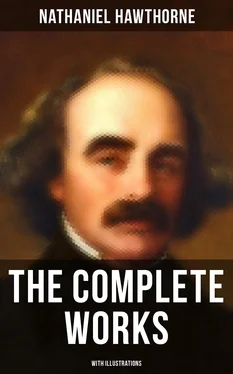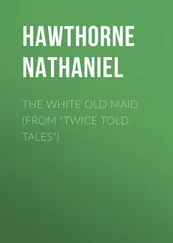To apply this train of remark somewhat more closely to Judge Pyncheon. We might say (without in the least imputing crime to a personage of his eminent respectability) that there was enough of splendid rubbish in his life to cover up and paralyze a more active and subtile conscience than the Judge was ever troubled with. The purity of his judicial character, while on the bench; the faithfulness of his public service in subsequent capacities; his devotedness to his party, and the rigid consistency with which he had adhered to its principles, or, at all events, kept pace with its organized movements; his remarkable zeal as president of a Bible society; his unimpeachable integrity as treasurer of a widow’s and orphan’s fund; his benefits to horticulture, by producing two much esteemed varieties of the pear and to agriculture, through the agency of the famous Pyncheon bull; the cleanliness of his moral deportment, for a great many years past; the severity with which he had frowned upon, and finally cast off, an expensive and dissipated son, delaying forgiveness until within the final quarter of an hour of the young man’s life; his prayers at morning and eventide, and graces at meal-time; his efforts in furtherance of the temperance cause; his confining himself, since the last attack of the gout, to five diurnal glasses of old sherry wine; the snowy whiteness of his linen, the polish of his boots, the handsomeness of his gold-headed cane, the square and roomy fashion of his coat, and the fineness of its material, and, in general, the studied propriety of his dress and equipment; the scrupulousness with which he paid public notice, in the street, by a bow, a lifting of the hat, a nod, or a motion of the hand, to all and sundry of his acquaintances, rich or poor; the smile of broad benevolence wherewith he made it a point to gladden the whole world, — what room could possibly be found for darker traits in a portrait made up of lineaments like these? This proper face was what he beheld in the looking-glass. This admirably arranged life was what he was conscious of in the progress of every day. Then might not he claim to be its result and sum, and say to himself and the community, “Behold Judge Pyncheon there”?
And allowing that, many, many years ago, in his early and reckless youth, he had committed some one wrong act, — or that, even now, the inevitable force of circumstances should occasionally make him do one questionable deed among a thousand praiseworthy, or, at least, blameless ones, — would you characterize the Judge by that one necessary deed, and that half-forgotten act, and let it overshadow the fair aspect of a lifetime? What is there so ponderous in evil, that a thumb’s bigness of it should outweigh the mass of things not evil which were heaped into the other scale! This scale and balance system is a favorite one with people of Judge Pyncheon’s brotherhood. A hard, cold man, thus unfortunately situated, seldom or never looking inward, and resolutely taking his idea of himself from what purports to be his image as reflected in the mirror of public opinion, can scarcely arrive at true self-knowledge, except through loss of property and reputation. Sickness will not always help him do it; not always the death-hour!
But our affair now is with Judge Pyncheon as he stood confronting the fierce outbreak of Hepzibah’s wrath. Without premeditation, to her own surprise, and indeed terror, she had given vent, for once, to the inveteracy of her resentment, cherished against this kinsman for thirty years.
Thus far the Judge’s countenance had expressed mild forbearance, — grave and almost gentle deprecation of his cousin’s unbecoming violence, — free and Christian-like forgiveness of the wrong inflicted by her words. But when those words were irrevocably spoken, his look assumed sternness, the sense of power, and immitigable resolve; and this with so natural and imperceptible a change, that it seemed as if the iron man had stood there from the first, and the meek man not at all. The effect was as when the light, vapory clouds, with their soft coloring, suddenly vanish from the stony brow of a precipitous mountain, and leave there the frown which you at once feel to be eternal. Hepzibah almost adopted the insane belief that it was her old Puritan ancestor, and not the modern Judge, on whom she had just been wreaking the bitterness of her heart. Never did a man show stronger proof of the lineage attributed to him than Judge Pyncheon, at this crisis, by his unmistakable resemblance to the picture in the inner room.
“Cousin Hepzibah,” said he very calmly, “it is time to have done with this.”
“With all my heart!” answered she. “Then, why do you persecute us any longer? Leave poor Clifford and me in peace. Neither of us desires anything better!”
“It is my purpose to see Clifford before I leave this house,” continued the Judge. “Do not act like a madwoman, Hepzibah! I am his only friend, and an all-powerful one. Has it never occurred to you, — are you so blind as not to have seen, — that, without not merely my consent, but my efforts, my representations, the exertion of my whole influence, political, official, personal, Clifford would never have been what you call free? Did you think his release a triumph over me? Not so, my good cousin; not so, by any means! The furthest possible from that! No; but it was the accomplishment of a purpose long entertained on my part. I set him free!”
“You!” answered Hepzibah. “I never will believe it! He owed his dungeon to you; his freedom to God’s providence!”
“I set him free!” reaffirmed Judge Pyncheon, with the calmest composure. “And I came hither now to decide whether he shall retain his freedom. It will depend upon himself. For this purpose, I must see him.”
“Never! — it would drive him mad!” exclaimed Hepzibah, but with an irresoluteness sufficiently perceptible to the keen eye of the Judge; for, without the slightest faith in his good intentions, she knew not whether there was most to dread in yielding or resistance. “And why should you wish to see this wretched, broken man, who retains hardly a fraction of his intellect, and will hide even that from an eye which has no love in it?”
“He shall see love enough in mine, if that be all!” said the Judge, with well-grounded confidence in the benignity of his aspect. “But, Cousin Hepzibah, you confess a great deal, and very much to the purpose. Now, listen, and I will frankly explain my reasons for insisting on this interview. At the death, thirty years since, of our uncle Jaffrey, it was found, — I know not whether the circumstance ever attracted much of your attention, among the sadder interests that clustered round that event, — but it was found that his visible estate, of every kind, fell far short of any estimate ever made of it. He was supposed to be immensely rich. Nobody doubted that he stood among the weightiest men of his day. It was one of his eccentricities, however, — and not altogether a folly, neither, — to conceal the amount of his property by making distant and foreign investments, perhaps under other names than his own, and by various means, familiar enough to capitalists, but unnecessary here to be specified. By Uncle Jaffrey’s last will and testament, as you are aware, his entire property was bequeathed to me, with the single exception of a life interest to yourself in this old family mansion, and the strip of patrimonial estate remaining attached to it.”
“And do you seek to deprive us of that?” asked Hepzibah, unable to restrain her bitter contempt. “Is this your price for ceasing to persecute poor Clifford?”
“Certainly not, my dear cousin!” answered the Judge, smiling benevolently. “On the contrary, as you must do me the justice to own, I have constantly expressed my readiness to double or treble your resources, whenever you should make up your mind to accept any kindness of that nature at the hands of your kinsman. No, no! But here lies the gist of the matter. Of my uncle’s unquestionably great estate, as I have said, not the half — no, not one third, as I am fully convinced — was apparent after his death. Now, I have the best possible reasons for believing that your brother Clifford can give me a clew to the recovery of the remainder.”
Читать дальше












